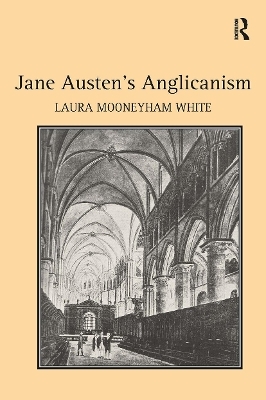
Jane Austen's Anglicanism
Seiten
2024
Routledge (Verlag)
978-1-032-92654-4 (ISBN)
Routledge (Verlag)
978-1-032-92654-4 (ISBN)
In her re-examination of Jane Austen's Anglicanism, White suggests that engaging with Austen's world in all its strangeness and remoteness reveals the novelist's intensely different presumptions about the cosmos and human nature. White argues that viewing Austen's Anglicanism through the lens of primary sources of the period provides a context for
In her re-examination of Jane Austen's Anglicanism, Laura Mooneyham White suggests that engaging with Austen's world in all its strangeness and remoteness reveals the novelist's intensely different presumptions about the cosmos and human nature. While Austen's readers often project postmodern and secular perspectives onto an Austen who reflects their own times and values, White argues that viewing Austen's Anglicanism through the lens of primary sources of the period, including the complex history of the Georgian church to which Austen was intimately connected all her life, provides a context for understanding the central conflict between Austen's malicious wit and her family's testimony to her Christian piety and kindness. White draws connections between Austen's experiences with the clergy, liturgy, doctrine, and religious readings and their fictional parallels in the novels; shows how orthodox Anglican concepts such as natural law and the Great Chain of Being resonate in Austen's work; and explores Austen's awareness of the moral problems of authorship relative to God as Creator. She concludes by surveying the ontological and moral gulf between the worldview of Emma and Oscar Wilde's The Importance of Being Earnest, arguing that the evangelical earnestness of Austen's day had become a figure of mockery by the late nineteenth century.
In her re-examination of Jane Austen's Anglicanism, Laura Mooneyham White suggests that engaging with Austen's world in all its strangeness and remoteness reveals the novelist's intensely different presumptions about the cosmos and human nature. While Austen's readers often project postmodern and secular perspectives onto an Austen who reflects their own times and values, White argues that viewing Austen's Anglicanism through the lens of primary sources of the period, including the complex history of the Georgian church to which Austen was intimately connected all her life, provides a context for understanding the central conflict between Austen's malicious wit and her family's testimony to her Christian piety and kindness. White draws connections between Austen's experiences with the clergy, liturgy, doctrine, and religious readings and their fictional parallels in the novels; shows how orthodox Anglican concepts such as natural law and the Great Chain of Being resonate in Austen's work; and explores Austen's awareness of the moral problems of authorship relative to God as Creator. She concludes by surveying the ontological and moral gulf between the worldview of Emma and Oscar Wilde's The Importance of Being Earnest, arguing that the evangelical earnestness of Austen's day had become a figure of mockery by the late nineteenth century.
Laura Mooneyham White is Professor of English at the University of Nebraska - Lincoln, USA. Her scholarship focuses on the novels of Jane Austen and other works of nineteenth-century British literature.
Part 1 Jane Austen and Anglicanism; Introduction, Laura Mooneyham White; Chapter 1 Jane Austen's Religious Inheritance: The Georgian Church, Laura Mooneyham White; Chapter 2 Jane Austen as an Anglican and Anglicanism in the Novels, Laura Mooneyham White; Chapter 3 Austen and the Anglican Worldview, Laura Mooneyham White; Part 2 The Sins of the Author; Chapter 4 Wordplay, Candor, and Malice, Laura Mooneyham White; Chapter 5 World-making, Laura Mooneyham White; Chapter 102 Coda Austen and The Importance of Being Earnest, Laura Mooneyham White;
| Erscheinungsdatum | 16.10.2024 |
|---|---|
| Verlagsort | London |
| Sprache | englisch |
| Maße | 156 x 234 mm |
| Gewicht | 421 g |
| Themenwelt | Geisteswissenschaften ► Sprach- / Literaturwissenschaft ► Anglistik / Amerikanistik |
| Geisteswissenschaften ► Sprach- / Literaturwissenschaft ► Literaturgeschichte | |
| Geisteswissenschaften ► Sprach- / Literaturwissenschaft ► Literaturwissenschaft | |
| ISBN-10 | 1-032-92654-6 / 1032926546 |
| ISBN-13 | 978-1-032-92654-4 / 9781032926544 |
| Zustand | Neuware |
| Haben Sie eine Frage zum Produkt? |
Mehr entdecken
aus dem Bereich
aus dem Bereich
Poetik eines sozialen Urteils
Buch | Hardcover (2023)
De Gruyter (Verlag)
59,95 €
Entzauberung und Faszination des Immergleichen in Literatur und Film
Buch | Softcover (2024)
Springer Fachmedien Wiesbaden GmbH (Verlag)
84,99 €
Buch | Softcover (2024)
belleville (Verlag)
20,00 €


